DUI Laws: But … Tiger Woods Wasn’t Driving
By now I’m sure most of you have heard about Tiger Woods’ latest brush with the law … a DUI arrest near his Jupiter Island home in Florida.
This arrest has (like nearly everything these days) sparked a bit of controversy with some claiming police had no right to arrest the impaired Woods because he was not actually driving a car when he was taken into custody. Nor was there an indication of alcohol consumption.
So why, you ask, would police officers arrest a person for simply sitting inside their car NOT drinking alcohol? Well, it goes something like this …
First, Mr. Woods wasn’t merely sitting in the car listening to his favorite jams on the radio. Instead, police found him seated behind the wheel with the engine running and the lights on … stopped in the right lane of a Florida roadway. This took place at night/early morning hours.
When officers asked questions (they had to wake him to begin the questioning), Woods responses were slurred and sluggish. He was confused and disoriented and didn’t know how far he was from his home. Not exactly the behavior of a person who’s brain is not in a state equal to that of a bucket filled with wriggling worms. Or, as some of my old acquaintances in the south used to say, “He was as “effed-up” as a bucket of worms.” By the way, “effed” was not the actual portion of vocabulary that typically spilled out when using this particularly charming phrase.
So there’s the basis for the stop—Woods’ car sitting in the road, running, with headlights on. Yes, it’s still considered a traffic stop even when the suspect’s car is already in a stopped position.
But why arrest for DUI when the car is sitting still? And no alcohol showing up on the roadside testing device? Or a breathalyzer? What’s up with that?
Florida law, like other states, requires you to take a breath, blood, or urine test if you are arrested for DUI. This law is called the “implied consent” law, and it states (I’m paraphrasing here) that if the operator of a vehicle is arrested by an officer who has probable cause (in this case a car sitting in the road, running, with headlights on) to believe that they’ve been driving under the influence of a substance, then they consent to taking a chemical test of their blood, breath or urine for the purpose of determining your blood alcohol content (BAC), or for other drugs. Drivers cannot legally refuse without penalty.
So yes, you could be arrested for a DUI even if you are not driving. If a driver has physical control of the vehicle while under the influence of alcohol or drugs or other chemicals, then that can be enough for an officer to arrest you. Physical control, by the way, doesn’t always mean behind the wheel motoring down the highway. Instead, it simply means that the driver is in a position to move the vehicle (or other self-propelled equipment, such as a tractor or even a riding mower). Even if the driver is asleep when the officer makes contact, the potential that the “driver” could wake up and operate the vehicle has been enough for Florida courts, among others, to rule that the driver had actual physical control of their vehicles. Griffin v. State457 So.2d 1070 (1984)).
Now, back to Tiger Woods. During their investigation, Woods told officers he’d recently had back surgery and was taking four medications, including the often abused opioid-based Vicodin.
Woods failed the roadside field sobriety tests and officers noted that he had trouble walking and it appeared that it was a real chore for him to keep his eyes open. By the way, one obvious sign that someone is using/abusing Vicodin is extreme drowsiness/difficulty keeping eyes open.
So, after all was said and done, Woods was arrested for DUI.

The arrest is solid because Woods was, after all, under the influence of drugs (prescription medications). This is nothing new. People abuse prescription drugs all the time. Every day, in fact. And those people also get behind the wheels of their cars and they drive, while heavily impaired. Doing so is no different than driving while under the influence of alcohol. Impaired driving is impaired driving no matter the substance that causes the “bucket of wriggling worms” inside your brain.
Some states have per se laws that make it illegal to operate a motor vehicle with any detectable amount of certain drugs in one’s system.
Woods will undoubtedly claim that the mix of medications was the cause of his impairment, and a judge will probably let him off the hook. Why? Money. Fame. Fortune. And merely because he’s Tiger Woods and not ordinary ‘ol you or me.
Ain’t that as “effed up” as a bucket of worms.
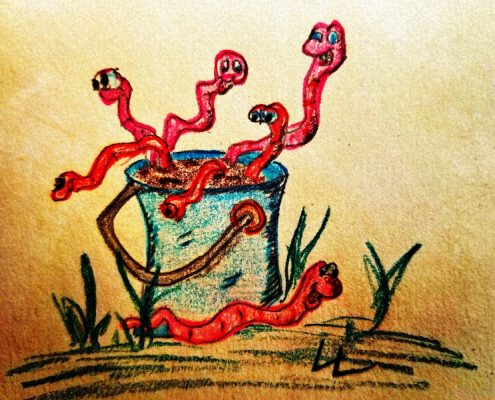
Note – The above images are my creations, as sad as they are. I purposely pen these drawings in the crude and goofy style you see on this site. Why do I draw them this way? Because I, too, am goofy.


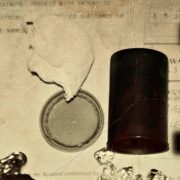
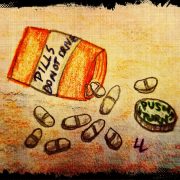

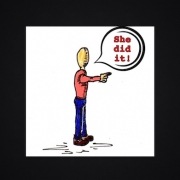

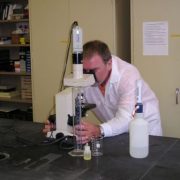



Just have to ask…how do you discern if someone is legitimately napping or under the influence at the side of a road? Seems like the driver is at a disadvantage. And on my private property? So an officer can come on my property, with me in my car and insist I take a sobriety test? A quandary…you can’t ascertain ‘under the influence’ unless you assume ‘under the influence’. Isn’t that why people get a little testy about these random situations? Damned if you do, damned if you don’t.
First, if someone is concerned about an officer having difficulty choosing between drunk and asleep, well, the best option would be to not drink or do drugs before driving. 🙂
Officers look for signs of impairment. With those present, there’s probable cause for arrest or further investigation (field sobriety tests, for example). No signs of impairment = the driver going on his/her merry way.
With that said and to answer your question about private property. No, officers won’t drive up in your driveway searching for people asleep behind the wheel. On the other hand, if officers witnessed a person stagger out of the house, fumble with the keys in an obviously impaired stupor, and then get behind the wheel and start the car … then yes, they could intervene (in this case they’d probably have them go back inside with a responsible person). Or, if they saw the car moving on the street and had probable cause to stop it, then they could follow it into the driveway to make the stop.
Remember, probable cause is the key. Without it there can be no stop. Somebody sitting in their car while in their driveway with the motor running is not probable cause. Always have to have probable cause.
By the way, a car parked on the shoulder of a roadway is enough for an officer to investigate the situation. Then, if they suspect and find evidence that the driver is under the influence … well, see Tiger Woods. If the person is simply sleeping, officers will easily be able to make that determination. But, they still can’t allow the person to sleep on the side of the highway. It’s too dangerous. They’d have them move on to somewhere safer. And, they’d most likely follow them to be sure they were okay to drive and that they moved on to a safer place.
These aren’t random situations, by the way. Officers aren’t out tossing darts hoping one will stick and give them more to do than they already have on their plates. In this, like many, many other situations that occur every single day, they’re investigating something they see happening. They don’t drive by 25 parked cars and then pull in behind the 26th simply because the music stops playing (musical chairs). All illegally parked vehicles get checked at some point, especially when they’re on the side of a major roadway. A parked car on the side of a highway is a danger to other drivers. At the very least, they cause people to slow down (being nosy) which often causes rear-end crashes, pileups, etc.
Thanks, Lee, for the explanation. Got it….Probable Cause is the first consideration. Without it, then any officer at any given time could rankle that innocent snoozer. I personally would be rattled if I pulled into a rest area for a ten minute nap and someone knocked on the window.
And for off-the-shoulder stops—an officer sat with us for 30 minutes one evening, lights flashing, on a busy freeway, hills of Virginia, on a curve, while 18 wheelers whizzed by. Dangerous spot, he said, for a blown tire.
We do love our people who serve and protect.
Interesting discussion…and I must say, I’m inclined to listen to Mr. Woods’ rendition—-However, (I’m avoiding But) Lee’s point of being in the unknown driver stopped in the middle of the right lane, car running and lights on surely explains a reasonable approach by the officers–hats off to them. If Mr. Woods had been on the far side of the road, engine off, then I would, as an officer, drive him home and let it be. So let’s say he was out doing what he had every right to do, long day, pain kicks in, he takes the prescription and has to go home while he’s in a good frame of mind. (Does this sound familiar to anyone? been there, done that.) Then, the pills kick in at an unusual rate (happens for a variety of clinical reasons)–he is in a quandary, becomes disoriented and wa-la, stops the car. Thus, he had been driving under the influence and attempted to correct the situation. A reasonable person would say ‘okay, I am under the influence’, pay the consequences–fine, medical review, etc. Woods record seems to fall into that category. Now here is what I find totally offensive. If it were you or I, it wouldn’t be in the newspaper, an ugly mug shot would not have been posted all over the world and our personal home address would not have been made public. This was an outright abuse by the media to heighten this event and ridicule Mr. Woods. I personally think that is criminal. It’s unlikely court will brush this under the rug…he’ll probably pay the fine—why not? But I would want my lawyer to go after the reporters who invaded my personal business. (Vicodon effects individuals in different ways…an abuser certainly takes to the point of disorientation but there are cases of legitimate use where it has an unanticipated effect. So…that still makes Lee’s point valid. Can’t drive while on pain meds.)
Wil, take a peek at my followup piece. The video (a partial) of the arrest is there along with more detail. You can see with your own eyes the danger someone in this condition poses to other drivers, etc. The fact that anyone is on the highways in this state is beyond the level of offensive reached by reporters who wrote about it (and I am no fan of the “news” media).
Woods knowingly took the medication and drove while highly and horribly impaired. That’s illegal, and deadly. I’ve seen too many mangled bodies of adults and children and babies to have any sympathy for people who know the effects of pain meds yet still choose to take them and then drive on public highways. Woods is no stranger to being high on medication. The man in this video needs help for a problem. He’s most likely an addict and needs treatment. I don’t believe in jail for these folks, but I do believe he needs to stay off the roads while high.
https://leelofland.com/the-abcs-of-tiger-woods-dui-arrest/
Regarding driving a DUI suspect home. That’s typically no longer allowed (not to say it’s not done, but shouldn’t be) due to liability issues. Say an officer drives a drunk guy a ride home and he finds another set of keys to another and goes out and kills someone, or himself. The officer, department, and city are most likely responsible because that’s not the proper procedure. Not to mention having to live with knowing you contributed to someone’s death by allowing the opportunity for the drunk to get back on the streets.
Remember, too, that driving is a privilege, not a right. So no, he didn’t have the right to drive.
Years ago, a friend’s father – on the way back to the hotel from her brother’s wedding rehearsal dinner, of all times – realized he’d had too much to drink and shouldn’t be driving. He called a tow truck – I don’t know why, I guess it made sense to him at the time – and that triggered him being arrested, because he was “in control” of the car, since he had the keys. That stood out as one of the most chilling things I’d ever heard.
And yes, I’ve always assumed I didn’t hear the whole story…
Still, this seems wrong. If you realize you are effed up, pulling over to the side of the road and waiting it out seems like a reasonable option to me. DUI seems like too serious a crime for someone who is avoiding the D in UI.
If the officers demanded he call a cab and his car be towed, I can see that.
Once upon a time when I was eighteen, I felt some bad allergies coming on. I bought a time-release capsule of Benadryl. Being young and having no idea how the time-release capsule worked, I broke it open before drinking it down with a glass of water. I hit the road. Soon, I pulled over because I couldn’t keep awake. I kept the motor on and the air-conditioner on while I slept it off because this was the desert and a 100 outside.
I was not approached by a cop. But it frightens me to think I could have had a DUI on my record.
Martin, being charged with DUI when the person is indeed driving while under the influence of drugs or alcohol is not wrong. The person who consumed the drugs or alcohol, however, is at fault. They made the decision. Not the police, the drugs, or the car. If the driver truly wanted to avoid a DUI (and the possibility of killing people in car crashes) they would not, not ever, get behind the wheel in the first place.
Just don’t drive while consuming drugs of any kind. It’s that simple.
In your situation, I’m quite certain you wouldn’t have been charged with DUI because the the OTC med wouldn’t have caused you to fail field sobriety tests or breath tests. There’s a big difference in Benadryl and opioids, pot, and alcohol, and how the latter three affect how your body functions. You were sleepy, not high, and the police would have recognized your condition as such. They may have questioned the situation, but there would have been no offense.
Not sure what would have happened. Chlorpheniramine (Benadryl) at the higher OTC dose, impairs driving as much as 0.12 alcohol. (I’m a pharmacologist, taught this in class from a study.)
Enough drowsiness seems as sluggish to me as intoxication. Maybe I could have slapped myself out of it.
I mildly take Tiger Woods side on this. There is a difference between when you take pills and you are intoxicated, absorption being a delayed process. He may well not have been intoxicated when he started driving, he felt the pills kick in and he made the most reasonable choice: to stop driving immediately. My support is mild, because I am describing the best case scenario. He probably took the pills, tried driving while intoxicated and then finally gave up. IANAL but it seems that the law is about being intoxicated, not about pill ingestion.
This reminds me of a question on the Driver’s License Exam in DC: Is it wrong to make a U-turn on a One Way street? The answer was: No. If you find you have started down a One Way street (presumably by accident) you should immediately pull over and make a U-turn when the coast is clear.
Sorry, Martin, I can’t agree. Woods knew what he was taking and the effect it had on his body and mind when he took the Vicodin (not sure about the others, just Vicodin). He is no stranger to the effects of pain medications. He knew and he still drove. He’s responsible. And it is about intoxication, and he was quite obviously impaired as evidenced by slurred and sluggish speech, had trouble walking and staying awake. And he failed the field sobriety tests.
You as a pharmacologist know the effects better than most, including me (although, my wife is microbiologist who was senior director for a couple of biotech companies – new drug development – who’s been to the FDA to present those new drugs for bacterial pneumonia and cystic fibrosis, and won approval).
Still doesn’t change the law. He was in control of the vehicle and he was impaired by a voluntarily-ingested drug. Doesn’t mean he won’t be cleared of all charges, though. The right mix of judge and/or attorneys and … well, you know.
I tend to agree.
Tiger Woods used the “meds” excuse in 2009 when he hit a tree and his then wife came out and tried to bash him with a 9-iron because she’d learned of his sexual excesses. Not to get into the legals of such, but Tiger Woods knew, admittedly, what drugs did to him. So why was he driving? He’s rich he could have hired a driver! I had a spinal fusion in the fall of last year. The prescribed amount of oxy made me so loopy getting out of bed was dangerous. No way would I get in a car and drive. I’m not rich but I do have a husband. 😀
Lee, your point about liable for arrest in a stationary car raises this question: If I’m at an interstate freeway rest stop in Minnesota in the winter at 2:00 am, on my way home from a long trip, taking a nap in my car with the motor running so I can have the heat on, can I be arrested for a DUI? Or is the fact Woods’ car was on a road, not in a parking lot or rest area, the differentiating factor? Thanks.
Chris
Yes, you could be charged with DUI if operating a motor vehicle, at any time, while impaired. This includes while on private property such as your very own driveway. A rest stop, by the way, is public/state property. In Virginia, for example, rest areas are operated by the VDOT (Virginia Department of Transportation), the good folks who maintain the highways and roads throughout the Commonwealth.
As always, I recommend that you check with the laws of the state you’re asking about, just to be safe.
Thanks, Lee. Nice to know, if not a bit disconcerting because drivers are constantly urged to pull off the road and take a break (or a nap) if we are tired in order to avoid causing an accident from falling asleep at the wheel. Wondering if we now need “designated napping zones” at rest stops where drivers can sleep in their cars without fear of arrest. 😉
Napping when tired, after pulling off the road is fine, and encouraged, and nobody gets arrested for doing so. Getting behind the wheel after/when using drugs is not. That’s the act that’ll land someone in jail. But, it’s still best to pull over and rest (after turning off the engine and removing the keys from the ignition), which is far better than crashing and killing innocent people.
Just don’t drive while consuming drugs of any kind. It’s that simple.
Be careful in Virginia. They try to throw people in jail for minor moving violations.
Foolishly, I got behind the wheel to drive to my doctor’s office for an exam after being proscribed some drug that made me loopy. I had the hiccups, believe it or not. And they gave me a (very low) dose of something like Thorazine. Why? I can’t remember. One of your physician friends may know. But then I was told to come in for an exam when the drug didn’t work. Like an idiot, I complied. And fell asleep on the exam table. And when I woke up, they sent me home. With more meds.
If the drive there went fairly well, the drive home could have put me in jail.
So now you have an absolute cure for the hiccups. Try to keep a car on the road while under heavy sedation. Scared them right out of me.
Yes, I got a bill.
Makes absolute sense, the police did him a favor getting him off the road.
While his initial public statements on the arrest sound like those of a guilty man covering his keister, later news reports appear to support his explanation. I think there is, at this time, reasonable doubt. I’m reserving judgement. Not because he’s Tiger Woods, but because if I were in the position described by his public statement, I’d want the same.
That said, I consider it irresponsible for anyone on strong prescription meds to get behind the wheel without first understanding the possible side effects and interactions between all meds being taken. If he knew all that and still got behind the wheel in the wee hours, a slap on the wrist is insufficient response.
Reasonable doubt/reserving judgement about what, Jonathan? His car was on the side of the road or partially in the roadway. It was running. Woods was asleep or passed out behind the wheel. He was in control of the vehicle. He told police he’d consumed medication, a type that will definitely impair judgment and ability to drive. He failed field sobriety tests. He apologized for the situation. I’ve not seen a more clear-cut case of DUI in all my years as a cop.
After thinking a bit more, I agree.
My reasonable doubt is not about whether he was in control of the vehicle while impaired, but whether he was being willfully irresponsible in driving after taking his meds. Which I suppose is a philosophical question that has nothing to do with his guilt or innocence under the law.
And it’s absolutely a moot point if the impaired driver crosses the centerline in the path of your loved one.
Jonathan – Any medication that could cause drowsiness or dizziness is a medication that should not be taken before operating a vehicle. To do so is irresponsible and illegal if it impairs the ability to drive safely. I’d be more than willing to bet that Mr. Woods knows Vicodin impairs his abilities to do anything except sleep.